Ho Chi Minh’s fundamental views on social development seen as direction to improve the efficiency of Viet Nam’s current social development management
Communist Review - Ho Chi Minh's views on social development as a part of Ho Chi Minh's thought with progressive, humane and developmental values are set to orient and lead the way for social construction towards a rich, strong, democratic, just, and civilized Viet Nam, promoting comprehensive and harmonious development in the current period.
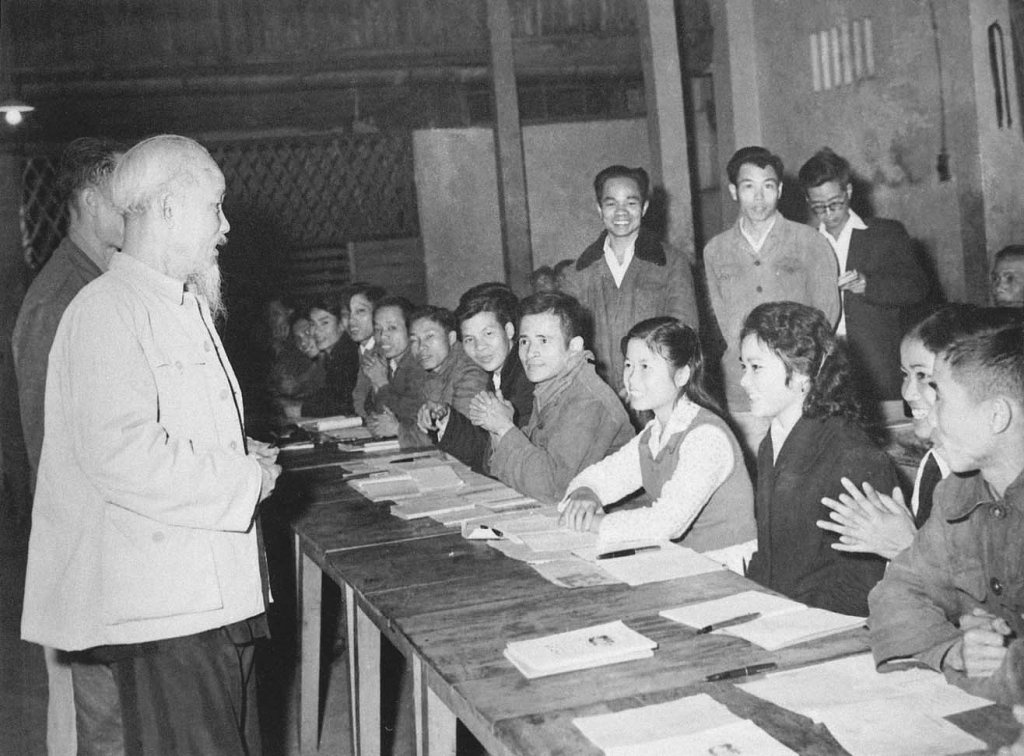
President Ho Chi Minh visitingan evening cultural and technical continuation class of workers at May 1st Auto Factory, the flagship of Hanoi’s cultural supplementary movement in the industry (1963) _Photo: Hochiminh.vn
In a narrow sense, “society” covers an aspect of the “total society” structure (i.e. economic, political, cultural, and social) and a gathering of classes, strata, social groups, families and individuals. With timeless values, Ho Chi Minh's views on social development are a part of his thought on the liberation of nation, class, society and people in line with Viet Nam's revolutionary reality and of great importance fordirecting human rights promotion and protection as well as building a developed society.
1. When the national independence had not been gained, all the classes, strata, and members in Viet Nam aimed to fight for that goal with each individual’s rights integrated into the nation’s. Social liberation was also referred to as national liberation whose urgent goal and task was to drive the colonial empire out of the country and regain power. When the national independence was not gained, it was improper to talk about the developmental rights of each social class or individual.
Ho Chi Minh strongly criticized the counter-development features in a colonial society through many of his works and articles in the 1920s such as high fees and taxes, poisoning the people with alcohol, opium, creatingan obscurantist educational system and maintaining unsound customs to restrain the people. Therefore, social development could only be supported by the task of national liberation which was put first and foremost, followed by class liberation, social liberation, and human liberation. Despite limited conditions ruled by colonial policies, Ho Chi Minh always managed to find solutions to improve the lives of workers by forming social unions of workers (such as the Red Union, the Red Farmers’ Society, the friendship association). His ultimate aim was to mobilize forces to fight for national liberation, but this activity was also setto encourage the masses to fight for a better life (against high fees and taxes, demanding lower rent, interest, etc. for farmers; demanding 8-hour working day, against beating, demanding sickness leave, and the likes for workers), which resulted inpolitical maturity step by step. Thus, social development under the colonial regime was closely associated with the growth of the working class and inseparable from the daily struggle for the people's welfare and democracy, which is part of the national movement.
For workers, the struggle against their owners brought about specific improvements likehigher wages and shorter working hours. For farmers, although the slogan "plowmen musthave fields" was temporarily forgotten in order to centre on national liberation goal, Ho Chi Minh still advocated confiscating the land of the imperialists and Vietnamese crooks to distribute to the poor peasants, actively campaigning forreduced rent and interest, public land redistribution. The spirit of mutual affection, sharing, assistance to reduce suffering and unhappiness for those who suffered oppression, injustice and disadvantage in a colonial society was clearly boosted through revolutionary campaigns such as popularizing the national language, providing social relief in the event of crop failures, natural disasters.
2. When the national independence was achieved, the Communist Party and State of Viet Nam attached great importance to social and human development, which was seen as a measure of the new regime’s good nature, affirming the legitimacy of a ruling party. It was no coincidence that just one day after the declaration of national independence, in the very first session of the Provisional Government Council of Viet Nam (September 3, 1945), President Ho Chi Minh highlighted six urgent tasks that wereall burning social issues related to the people’s vital interestssuch as fighting the so-called enemies in the name of hunger and ignorance, abolishing unreasonable fees and taxes, abolishing the opium and alcohol poisoning, holding general elections by universal suffrage, exercising freedom of religions and beliefs.
Ho Chi Minh wished that all adult Vietnamese would have jobs and stable incomes, and constantly raise their living conditions. Working and employment not only created incomes to better their life, but also helped them gradually mature their personality, appreciate wealth, and live responsibly to themselves and the society, affirming the superiority of the new regime. Therefore, on March 2, 1947, he signed Decree No. 29 on the rights of employees (equivalent to the present Labor Law), which not only met the then urgent needs, but also showed his philosophy of social development.
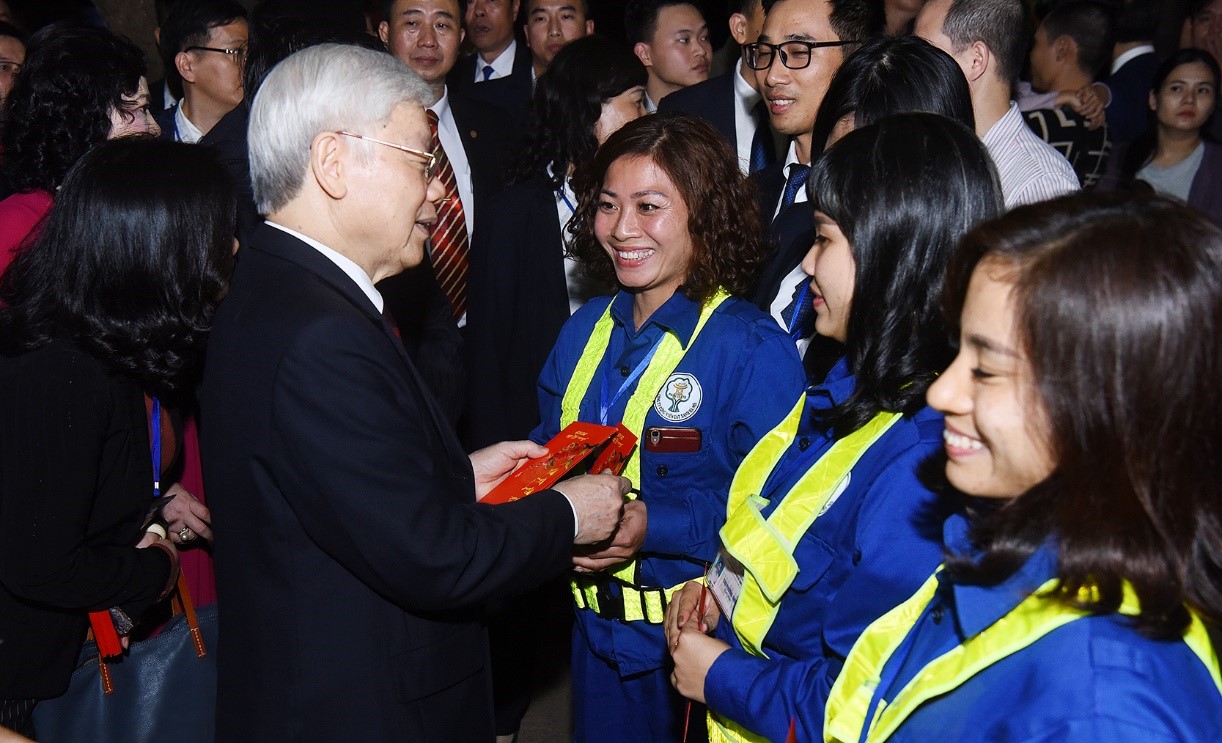
Secretary General of CPV Central Committee Nguyen Phu Trong extending New Year greetings toHanoi Green Tree Company workers working on Thanh Nien Street _Photo: Documentary
The battle against enemies of “hunger” and “ignorance” was initiated by Ho Chi Minh in 1945 when Western countries deep in the competition for resources and markets had not realized looming consequences caused by poverty and hunger as well as illiteracy to national development and mankind development. Environmental protection activities and "Tree Planting Festival" were initiated by him when the human race was still trying to live and develop by extracting natural resources andunaware of the so-called revengeto be taken by nature as exploitation did not go together with natural resources protection and renewal. His thoughts were very modern and ahead of his time, even the World Health Organization (WHO), when considering the people's health care a strategic task with the health sector playing a pivotal role.
It took decades for these ideas to be further explored and become a global action plan integrated into the UN-initiated Millennium Goals.
3. Society only has conditions to develop comprehensively thanks to socialism and social development criteria shape socialist values in each stage of national development. According to Ho Chi Minh, exploitative regimes can neither bring about true social development nor fully develop human potentials and strengths. Prior to the foundation of the Communist Party of Viet Nam, he deeply analyzed that the bourgeois democratic revolutions only aimed at replacing one exploitative regime with another more complete exploitative one. With a strong belief in the good nature of socialism, Ho Chi Minh said that only socialism can radically liberate people from all forms of oppression and injustice, bring about a comfortable, free, and happy life, enabling its people to develop comprehensively both as individuals and as social community. According to Ho Chi Minh, socialism is dynamic and developed towards the people’s legitimate needs, different from the dogmatic and rigid model of socialism that distances itself from their practical needs. He regarded human development and social development as the most important criterion of socialism through simple and close expressions, reflecting the essential needs for life quality that anyone could easily feel. It is a social system where “everyone feels comfortable, happy, and free; everyone is wise and virtuous. It is a good and glorious society”(1), with “wealthy people and a powerful nation", "better material and cultural life". He said that “No regime respects the people, takes their right personal interests into account, and satisfies them more than the socialist regime”(2). Therefore, social development can only create true values in socialism. Building socialism has no other purpose than to bring about comprehensive social development with people put at the center of development.”
4. Social development on the basis of a strong economy with a certain economic structure in a corresponding social structure. This point plays a crucial role in orienting social development based on Viet Nam’s specific conditions. During the war time, despite his devotion to leading the revolution for national liberation and reunification, Ho Chi Minh always focused on building a strong national economy that both ensured supplies from the rear to the front line and improved the people's living conditions. In the transition to socialism, knowing that the country was characterized by agriculture, poverty, backwardness, and under-developed economy, Ho Chi Minh advocated kicking off industrialization as soon as possible across the north in order to develop production forces, create increasingly abundant wealth, and better the people's living conditions. He called that economic structure "two legs" in the name of industry and agriculture.
Inevitably, changes in economic structure lead to changes in social structure. Before the policy of socialist reform (yr. 1958) at least, Ho Chi Minh frequently emphasized the need to maintain and encourage the development of a multi-sector commodity economy with "public-private partnership for mutual benefits". He clearly saw the role of social classes in economic development and social development. Therefore, a proper class policy was required, especially with the proprietors still playing a significant role in boosting economic growth, job creation and social development. In his work Political Basics, Ho Chi Minh said that “the private capitalist economy both exploits workers andbuilds the economy". He also supported public-private partnership for mutual benefits between employers and employees that not only reflects the employer-employee relationship, but also covers the cooperation between managers and employees. Obviously, when the power was owned by the people under the leadership of CPV, class relations were not the same as they used to bein the old regime. He stressed that “Capitalists do exploit, but the Government should forbid them over-exploiting workers and protect the workers’ rights. At the same time, for the long-term benefit, the workers should give the owners some reasonable profits without demanding too much”(3). Ho Chi Minh encouraged the public servants and businessmen to get rich legitimately and actively contribute to the revolution cause. In the context of subjective and hurried removal of the non-public economic sectors that still existed in Soviet socialism-modeled countries, it could be seen that Ho Chi Minh’s ideas were ahead of his time and respectfulof the objective law.
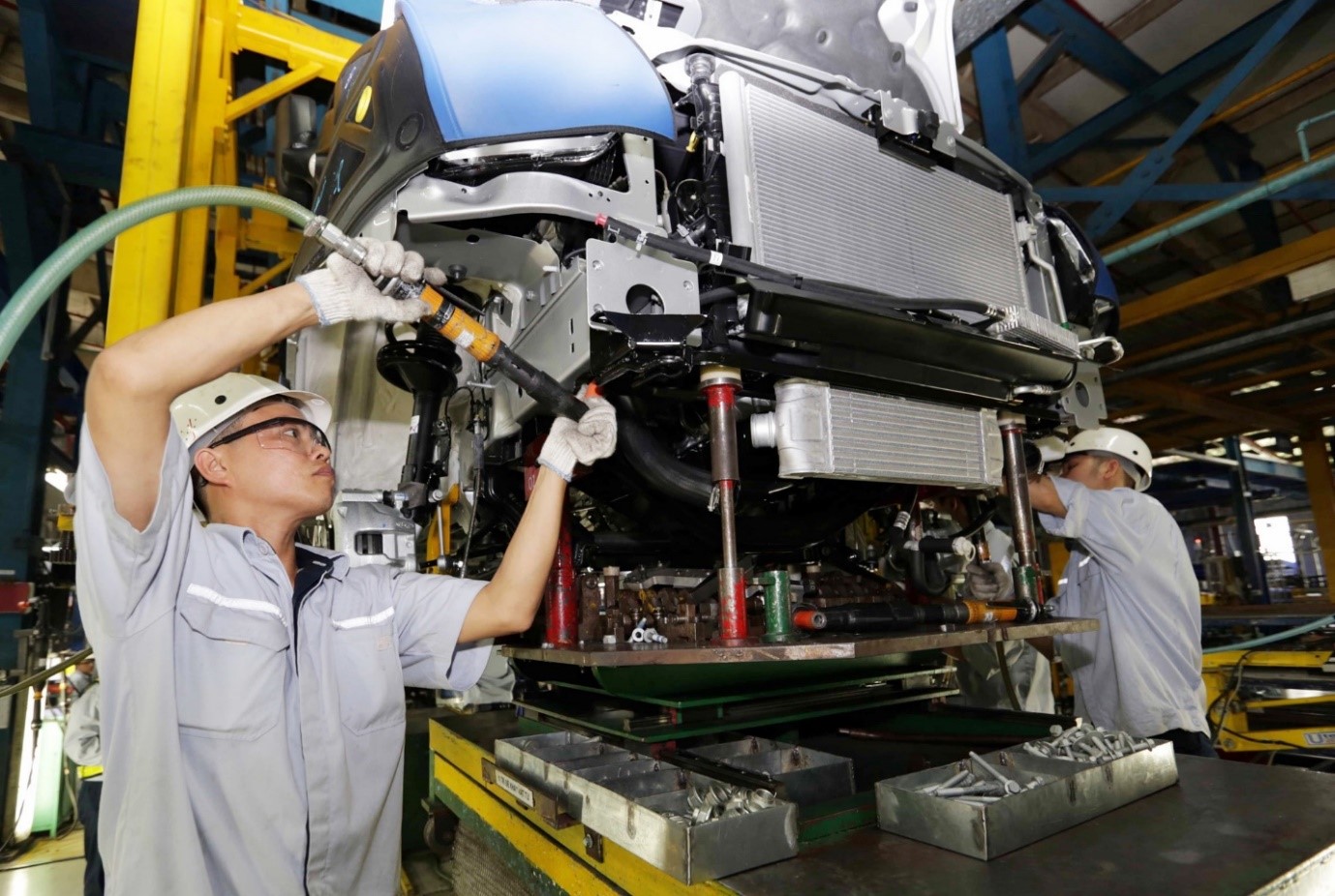
Taking care of the development of a strong working class worthy of the revolutionary leadership role and capable of mastering operations at factories, workshops and mines, creating a lot of wealth for society (In the photo: Assembling cars at Ford Viet Nam Factory, Hai Duong province) _Photo: VNA
Ho Chi Minh’s instructions are still valid today when Viet Nam are dealing with various social problems arising in the market economy, amidst the overlapping relations between employers and workers, managers and employees. On the one hand, these relations reflect the cooperation for developing the enterprises to create mutual benefits for both the employer and the employee. On the other hand, they reveal the struggle to make the employerabide the laws, ensuring the rights of employees and constantly increasing the company's social welfare. That story also requires new perceptions of class relations in the market economy when the power was owned by the people under the leadership of CPV and the working class and the working people have many tools to exercise their ownership.
5. Social developmentbased on the principle of non-exclusiveness, ensuring the right to development of all members in the society. Ho Chi Minh believed that any Vietnamese who has contributed to the national progress and development in specific historical conditions is certainly a member of the public and his development rights are guaranteed by the Communist Party and State of Viet Nam through the policies to build the working class, the peasantry, the intelligentsia, and other social classes. He attached great importance to building a strong working class worthy of their leadership role in the revolutionary cause so that they mastered operations at factories, workshops and mines, created wealth for the society, and truly pioneered in production methods, lifestyles, working disciplines together with building trade unions. Along with developing the working class, Ho Chi Minh always feltspecial affection for farmers through policies to restore land ownership, encourage the building of cooperatives and cooperative groups to help them overcome difficulties, promote collective strengths, constantly expand rural social welfare, build civilized villages, and abolish unsound customs. Understanding the contributions, sacrifices and disadvantages of farmers in the resistance war, he always reminded governments at all levels not only to mobilize the people's contributions, but also try to foster those strengths, and exempt farmers from taxes upon national reunification in his last instruction. Ho Chi Minh regarded intellectuals as the nation's precious assets in the revolutionary cause, demanded that talents be honored and given a favourable environment and favourable conditions for them to devote and strive. Understanding the characteristics of intellectuals, in order to strengthen this force to make great contributions to Viet Nam’s revolutionary cause, he always expressed his sincere affection, respected their brainwork, gathered and united intellectuals to participate in the revolution, and form solid and key trio allianceof workers, farmers, and intellectuals in the National United Front in Viet Nam. While attaching great importance to the development of the working class, the peasantry and the intelligentsia as the basic social strata, Ho Chi Minh properly recognized and appreciated the role of the national bourgeoisie and smallholders in Viet Nam’s diverse social structure whose strengths should be fully promoted and detailed guidelines were required for this class to develop in accordance with the national interests as well as the nature of the new regime.
This view contrasted with the bourgeois democratic ideas that exaggerated the role of the “elite” and the proprietor, disregarded the role of the working people, and left the poor, the uneducated, and the disadvantaged behind. It was also very different from the leftist sectarianism previously prevalent in the international communist and worker movement that absolutized the role of workers and peasants and excluded the other strata’s ability to grow and contribute. Ho Chi Minh had dialectical views of legitimate social stratification aseach person’s socio-economic origins, biological factors, risks, and the likes make the opportunity to access and the efficiency of using development resources vary among members in the society.
Therefore, ensuring the right to mutual development for all members of the society is a must without excluding any one towards the goal "The poor will have enough to eat. People who have enough to eat will get better-off. The better-off will get richer”(4). One the one hand, his view encourages the rich to "get richer" providing that the enrichment of one person does not threaten the other’s development opportunities, the enrichment must be surely honest and lawful. On the other hand, it enables the poor to develop by striving for "enough to eat" and then "better-off". This makes some valuable suggestions about managing social stratification in Viet Nam today, especially encouraging legitimate enrichment along with promoting sustainable poverty reduction, and shaping a social structure for harmonious development.
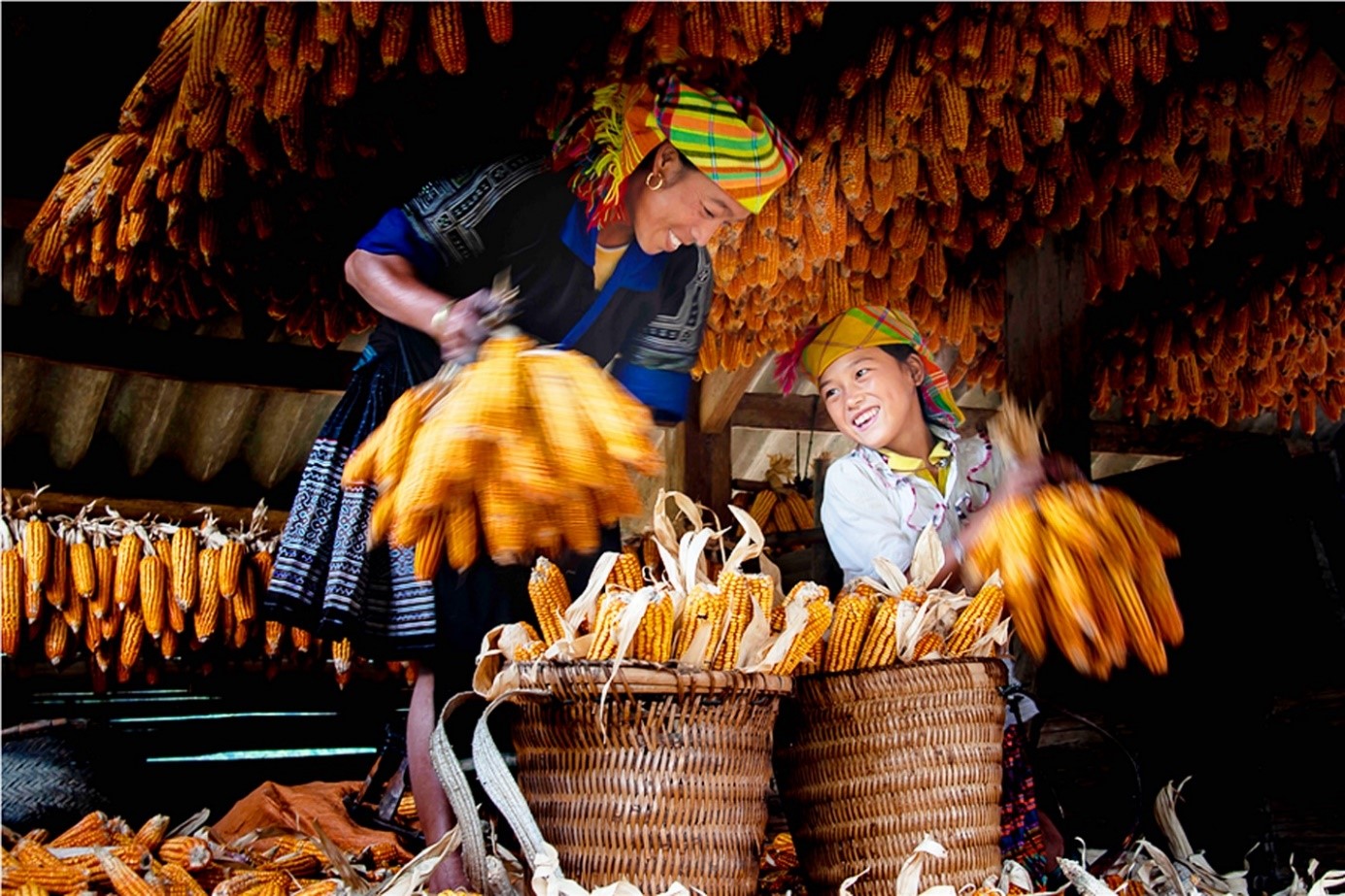
Practically ensuring the rights of equality, solidarity, respect, assistance for mutual development among ethnic groups through the support of the State and the efforts of each individual, each family, each ethnic group _Photo: Document pictures
Living in a multi-ethnic country, Ho Chi Minh considered multi-ethnicity as Viet Nam’s precious asset, so the country should practically ensure the rights to equality, solidarity, mutual respect and assistance for mutual development among ethnic groups through the support of the State and the efforts of each individual, each family, and each ethnic group. This contrasts with the ideology of racism, the ideology of elite nationalism, and the “divide-and-rule” policy of colonialism. Ho Chi Minh advocated ethnic groups with better developmental conditions supporting under-developed ethnic groups. He paid special attention to promoting the rapid and vigorous development in ethnic minorities, mountainous areas and revolutionary bases, ensuring security and defense as well as exercising the rights to mutual development among regions and ethnic groups.
As Vietnam is a multi-religious country, Ho Chi Minh upheld the spirit of respecting freedom of beliefs and religions, objectively assessedthe cultural and moral values of different religions, expressed his affection for the founders of religions; and initiateda variety of guidelines and policies to unite religions, unite ordinary citizens and religious followers, and encourage religious communities in Viet Nam to support national development. Therefore, social development is meant to take care of the material and spiritual life of the people of all religions and connect the people of all religions with the nation so that they will contribute to the national liberation and development cause. He criticized and uncompromisingly fought against all signs of religious discrimination, violations of the people's right to freedom of religions and beliefs as well as acts of harming the national interests and the revolutionary cause through religion.
Ho Chi Minh was particularly interested in social classes and groups that do not get many opportunities to development and suffer various disadvantages in Viet Nam. For women, who suffernumerous disadvantages in development opportunities due to the restraints caused by the backward feudal ideology, he advocated carrying out a revolution to liberate women and exercise equal rights for men and women, creating a favourable environment for women to participate in social work, study, strive and fulfill their motherhood and wifehood. According to Ho Chi Minh, it could be said that only half of the population had been liberated if women had not been liberated, the equality of men and women had not been demonstrated, and the equality of men and women showed onlyhalf-socialism. For children, he considered them as "buds on a branch", encouraged them to learn and self-improve to benefit their family and society, ensuring human capital for the future, so the country should formulate policieson their physical, intellectual, moral and aesthetic development. For the elderly, Ho Chi Minh respected, trusted, and appreciated them, he demanded proper care and encouragement policies so they could promote their real-life experience and responsibility to set examples for children and grandchildren, first in their family, clan, and village. The war invalids, martyrs, revolutionary contributors, who did not shrink from sacrificesand losses in the resistance war for national independence, should receive special care through social preferential policies. In his testament, he recommended taking care of the war invalids and revolutionary contributors after the national reunification, erecting monuments and memorial steles to remember the merits of heroes and martyrs, caring forthe war invalids’ living conditions, and opening vocational courses so that wounded soldiers, sick soldiers and their children couldbe self-supporting.
6. Social developmentbased on promoting equality of developmental opportunities among members of the society, harmonizing rights and duties, contribution and enjoyment. This key point influences the formulation of economic and social policies towards the sustainable development goal. Ho Chi Minh thought that each person’s developmental opportunity is realized when he can enjoy peace, independence, freedom, security and safety. When a country loses independence and sovereignty, its people cannot enjoy freedom and opportunity for development. An independent nation, a peaceful environment, and a safe society facilitate human development and encourage each member in the society to strive for common development. Developmental opportunities were also attributed to the expansion of social welfare system, forming the basis for the people’s comprehensive development, particularly in terms of education, culture, health care, and social assistance. Additionally, he was particularly interested in the disadvantaged including children, war invalids, martyrs’ family, women, ethnic minorities.
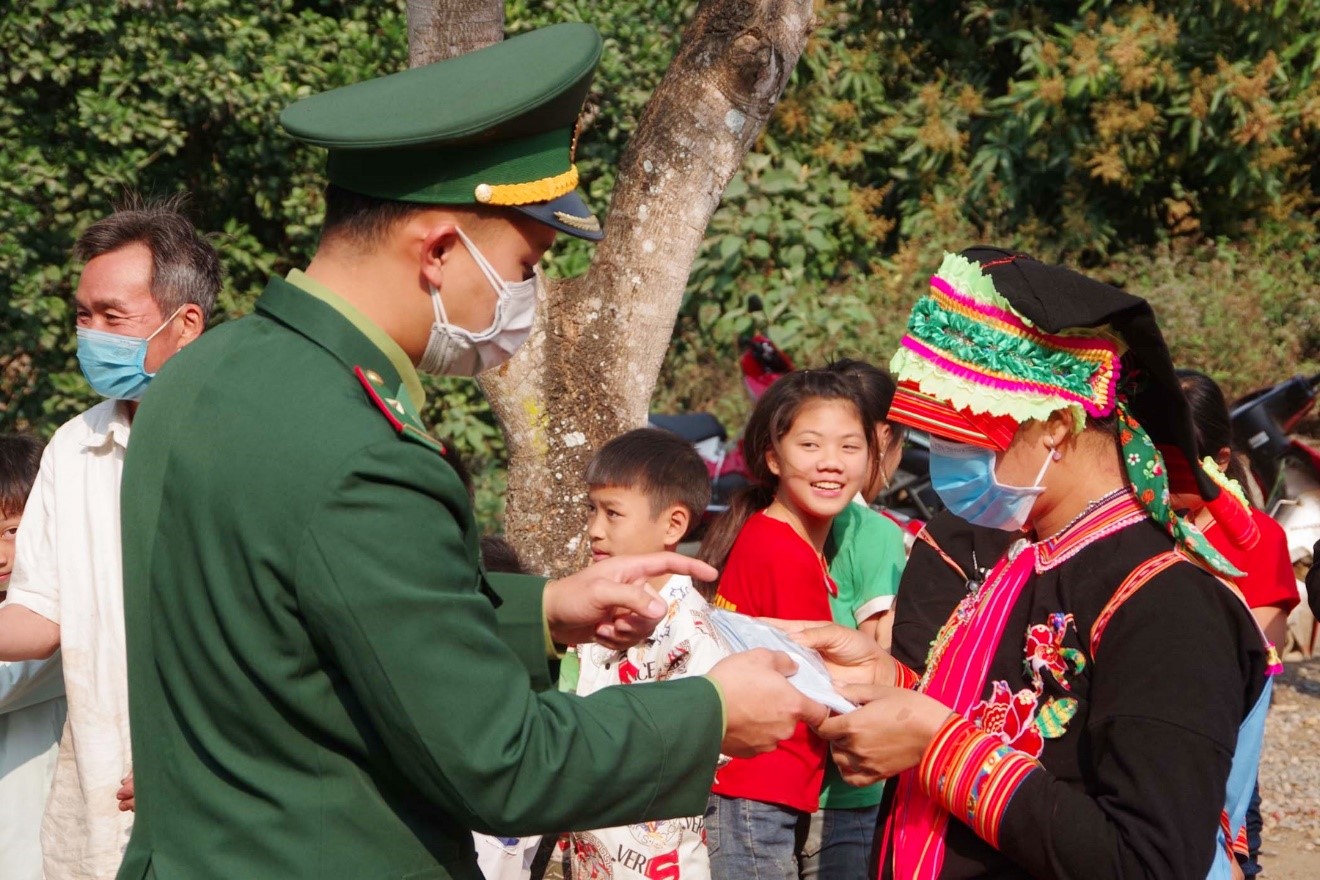
Developmental opportunities were also attributed to the expansion of social welfare system, forming the basis for the people’s comprehensive development, particularly in terms of education, culture, health care, and social assistance. (Photo caption: Ma Lu Thang Border Post officers and soldiers present medical facemasks to the people of Hung Beng village, Ma Ly Pho commune, Phong Tho district, Lai Chau province, Viet Nam ) _Photo: VNA
Ho Chi Minh viewed social equality as the harmony between rights and duties, contribution and enjoyment. He stressed: “Distribution must be directly proportional tothe amount of work done. The larger that amount is, the more the distribution is, and vice versa. The more difficult the work is, the more the distribution is. The easier the work is, the less the distribution is. One cannot equate all kinds of work performance as well as all kinds of jobs done. It is egalitarianism that should be avoided”(5). He criticized privileges because they were regarded as the root of unequal wealth distribution and take away developmental opportunities for disadvantaged social groups. He also criticized egalitarianism because it was unfair, it did injustice to those who had worked more but enjoyed less than those who had worked less, stealing their developmental motivation. Regarding social equality, it was needed to differentiate between "difficult" and "easy" work, also known as skilled and unskilled work. The equation of skilled work and unskilled work in wealth distribution were not supported by Ho Chi Minh's thought as it either checkedor crippledinnovation in management, science, literature, art, and the like. Therefore, the formulation of a rational distribution system is not only reflected in social welfare, but also social development, which is still topical in the context of socialist-oriented market economy development in Viet Nam today.
7. The ultimate aim of social development is to liberate people from all forms of oppression and injustice,facilitate comprehensive human development, respect the people's legitimate rights and interests,and build a safe and healthy societyfor every citizen to thrive. According to Ho Chi Minh, social development helped liberate people from all forms of oppression and injustice and create favourable conditions for their physical, intellectual, aesthetic and moral comprehensive development. The abolishment of economic facilities set up in the ousted exploitative regime was meant to liberate labour and empower people. Economic development does not have an objective by itself, but it aims at bettering material life and physical development, raising the people's desire for cultural enjoyment. A new culture and new morality are set to help people form their personality to live in harmony with the society, the community, nature and themselves. The progressive education system must be able to foster and fully develop each person’s inherent abilities and qualities to perfect himself and make positive contributions to the society. A democratic political system should empower its citizens, so that they canfully develop their mastery ability in all the aspects of social life. Economic, political, cultural or social development is meant to satisfy the people’s increasing needs, realizing the people's legitimate rights and interests.
In Ho Chi Minh's thought, social development is composed of various layers including the entire people or his compatriots, classes, social groups, families, and individuals. While Ho Chi Minh highly valued the individual’s legitimate rights, he criticized and uncompromisingly fought against individualism. According to Ho Chi Minh, although the individual’s legitimate interests were not contrary to the collective (or the community) interests, individualism went against collective interests. A proper attitude toward personal rights is required, rights always go together with duties and individualism should be rejected. That personal rights are not associated with duties only causes selfish personal interests to go against collective interests. The Communist Party and State of Viet Nam are in charge offostering and multiplying good human values, creating an institutional environment for the healthy development of human personality, respecting and protecting the legitimate personal rights, and harmonizing personal interests with collective (or community) interests. Sound social development contributes to each individual’s healthy development and actively support him to ensure security, safety and capacity for self-development.
Ho Chi Minh's fundamental views on social development are still valid in the current context and they should be further studied and creatively applied to social development management, orienting to build a developed society./.
---------------
(1) Ho Chi Minh: Complete Works, Truth National Political Publishing House, Hanoi, 2011, Vol. 8, p. 294
(2) Ho Chi Minh: Complete Works, ibid., Vol. 11, p. 610
(3) Ho Chi Minh: Complete Works, ibid., Vol. 8, p. 267
(4) Ho Chi Minh: Complete Works, ibid., Vol. 5, p. 81
(5) Ho Chi Minh: Complete Works, ibid., Vol. 13, p. 216
This article was published in the Communist Review No. 963 (April 2021)